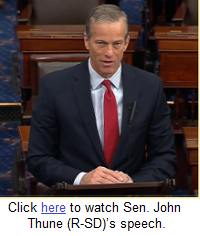Sen. John Thune (R-SD), the chamber’s number two Republican and chairman of the Senate Commerce telecom subcommittee, unveiled his Telecommunications Skilled Workforce Act Thursday. The measure is aimed at helping the U.S. catch up on the workforce demands of the 5G era. Thune’s bill is bipartisan. Co-sponsors are Jon Tester (D-MT), Jerry Moran (R-KS), Gary Peters (D-MI) and Roger Wicker (R-MS).
On the Senate floor, Thune said, “Current internet technology relies on cell phone towers.
But 5G technology will require not just traditional cell phone towers, but small antennas called ‘small cells’ that can often be attached to existing infrastructure like utility poles or buildings.”
Wireless providers will need to install roughly 800,000 small cells to support a nationwide 5G network, according to Thune. “And of course, after installation, every one of those small cells will have to be monitored and maintained. That will require a substantial increase in the telecommunications workforce.”
Thune explained: “It’s estimated that deploying the necessary infrastructure for 5G will create approximately 50,000 new construction jobs each year over the buildout period. And that’s just for construction.”
“Places like VIKOR Teleconstruction and Southeast Tech in Sioux Falls are already helping to train the 5G workforce of the future,” Thune said. He noted that industry and community colleges have stepped forward to provide training opportunities, but more work needs to be done.
The Telecommunications Skilled Workforce Act would compel the Labor Department to coordinate with the FCC chief in creating an interagency working group to develop recommendations for fostering this workforce, including identifying federal incentives.
The group would be required to identify existing federal programs that could be used to help address workforce shortages as well as ways the federal government could encourage or incentivize growth in the telecommunications workforce, including the deployment of fixed broadband in rural areas.
The measure would also direct the Department of Labor and the FCC to issue guidance for states to help them leverage existing federal resources for growing their telecom workforces – and help them improve recruitment for industry-led telecommunications development programs like the Wireless Infrastructure Association’s Telecommunications Industry Registered Apprenticeship Program. (Read industry reaction here).





Reader Interactions